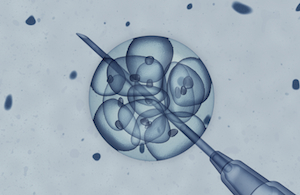Last year, Sir Mark Walport, head of the Wellcome Trust claimed that the impact of manipulating someone’s mitochondrial DNA would be as minimal as ‘changing the batteries in a camera’.
Is he right? Is there nothing substantial to worry about with this new technique, which could reduce the risk of children having potentially fatal illnesses caused by defective mitochondria?
I think it is far more significant than changing camera batteries. A year ago I wrote a blog warning that creating three parent embryos was unnecessary and unethical. CMF Chief Executive, Dr Peter Saunders has also blogged his concerns (here and here) and we have a new CMF File which explores in more depth why there are many reasons to be deeply concerned about this.
In the last two weeks our warnings about the safety of these new techniques in particular have been strongly reinforced.
Unnecessary, unethical AND unsafe
- There are two techniques proposed to eliminate mitochondrial disorders but tests on monkeys were only carried out on one of them. The other technique has not been successful.
- The monkeys only lived for three years, so we do not know long term effects or the effects that would be revealed as adults.
- Several experts expressed concerns to the HFEA about the mismatch and incompatibility of mitochondrial and nuclear genes but these were dismissed by the HFEA.
- A recent report in Nature cited the same concerns about incompatibility (again dismissed by the HFEA).
- The Nature report claims that the HFEA cannot substantiate their dismissal of the evidence.
- The Nature report also claims that the one successful monkey study was unrepresentative for the required treatment.
- Similar research on other organisms has had a negative effect on genetic development, especially for males.
- The HFEA has watered down its safety tests. It originally said tests on primates were ‘critical’ before the techniques are used in humans but now says ‘the panel no longer feels’ that testing on primates is needed.
- Other scientists have warned that we do not know whether mixing mitochondria DNA from two different origins is safe, and it ‘remains to be resolved’.
For more detail on safety concerns see this submission CMF has sent to the US Food and Drug Administration (FDA) who are shortly going to review this issue.
And out of line with every other county
The Daily Mail and Daily Telegraph reported this week that 34 European politicians, including eight British MPs and Peers, signed a declaration strongly condemning the UK’s plans to be the first country in the world to permit these new techniques.
What are their concerns?
- That never before has there been a member of the human species with more than two genetic parents.
- That this would take us across a threshold that all international bodies which have considered this have rejected.
- That this is comparable to eugenics.
- That it is incompatible with human dignity and international law.
The reality is, this technique is not equivalent to changing some camera batteries but to redesigning the camera itself.
The fact that that safety concerns are being expressed in Nature, and that the European declaration could now become the subject of a full debate or report, may perhaps have an impact in the UK. If the FDA were to reject it, that clearly that would leave Britain even more exposed.
Realistically, however, as with cloning and hybrid embryos, it’s highly unlikely that the UK Government will ignore the recommendations of the HFEA (even when claims of therapies are overhyped).
A telling article in the Guardian recently was headlined: ‘Science, the religion that must not be questioned’. The author, Henry Gee is a senior editor of Nature. He claims that debate and dissent in the UK are not so much not permitted as inconceivable.
‘Those who are scientists, or who pretend to be scientists, cling to the mantle of a kind of religious authority. And as anyone who has tried to comment on religion has discovered, there is no such thing as criticism. There is only blasphemy.’
No wonder it is so difficult to be heard. Nevertheless, we will continue to warn, along with others, that allowing these techniques to be developed and used will serve to consolidate Britain’s position as a world leader: in unethical, unnecessary and unsafe therapies.




